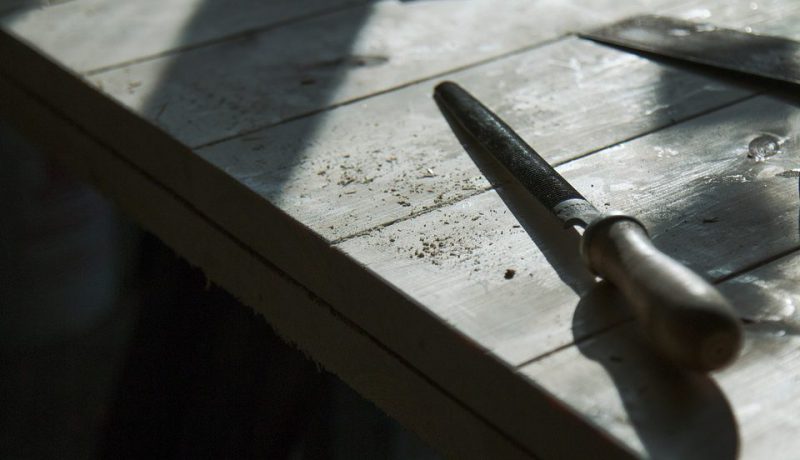Put on the grill, for sure, but here are some other tips to make the day a little more meaningful this year.I wanted to write about what the Catholic faith says about work, and since my workplace is Benedictine College, I did the natural thing: I asked philosophers and theologians. Here is their very Benedictine advice.
First, stare at a leaf — then “consecrate” your desk.

To work is to participate in the ordering of God’s creation, one theologian told me. That means work should be a prayer.
I told him that whenever I try to make my work a prayer I find myself mentally exhausted and can’t keep it up. So I just pop earphones in and listen to Pandora instead.
He gave me a tip from the Dominican writer Gerald Vann. He noticed that we give strong associations to objects that have been meaningful to us: Think of your lucky jersey or the sweater you wore on your first date. Why not use this phenomenon? Stare at an object, shut out all else, and contemplate how God fills it with meaning — for example how a leaf shows his handiwork, his purpose and his presence.
In this way you can train your mind to remember God whenever you see a leaf. Do this in your workplace and pretty soon, you will be surrounded not just with the tedious tools of your trade, but with God-purposed opportunities for grace.
Second, renounce slavery.

Once you have “consecrated” your desk, you are ready to start working the way God intended: As his partner in the perfection of the cosmos. But to be a partner you have to stop being a slave.
“Work was made for man, not man for work,” said St. John Paul. Stop working beneath the whip of the mortgage company, the tax collector and the demands of the Joneses, and begin working beneath the gaze of God.
Third, sit next to Jesus, the carpenter, at his bench.

God made his attitude toward work clear to us in a very direct and simply way: By becoming a carpenter.
By sitting down at Joseph’s bench he taught us without words that work is holy. By doing so for 30 years — the vast majority of his life — he made it impossible to consider work unimportant.
So, sit down there with him. Remember: When you pray, serve others, and speak of God, you are imitating what Christ did some of the time. When you go to work, you are imitating what Christ did most of the time.
Fourth, work to be seen.

You are supposed to witness to the world what a Christian life looks like. For most of us, that mostly means a Christian work life.
If you work thoroughly, carefully, conscientiously, and in harmony with the rest of your life, people will notice, and your faith will attract them. If you work sloppily, bitterly, and out of whack with your home life, people will notice that, too, and your faith will repel them.
Fifth, shop with other workers in mind.

As Pope Benedict XVI put it, “Every economic decision has a moral consequence.” When we shop, we should do unto our fellow workers as we would have them do unto us.
Practice the principle of subsidiarity in the marketplace: Whenever possible, reward entrepreneurs who respect their workers and serve customers’ real needs, and stiff the corporations that treat labor as a commodity and customers like suckers.
Sixth, switch your Amazon account to “no weekends.”

Speaking of buying with other workers in mind, the Catechism says that not only should we avoid working on Sundays, we should avoid making other people work on Sundays too.
Sunday rest is a God-ordained break that too many are denied. Don’t needlessly contribute to the problem. Stay out of stores and tell Amazon “no weekends.” That seems to be the only way to stop them from delivering on Sunday.
Seventh, work smart; rest smarter.

Leisure, not work, is the basis of culture. Rest is a time for human community — family, friendships and intellectual refreshment. It shouldn’t be a time to escape into a Netflix binge or hide in an alcohol haze. Neither should it be a time to work more to get ahead.
Even secular sources are starting to say the best way to spend your down time is to fast from screens, reconnect with human beings and fully experience the pleasures of life. Why not try it?
Eighth, pray for your boss.

Think of all you owe your boss: She hired you, she allowed your mistakes, and helped you improve. Without her, you wouldn’t have a job — a blessing that many, many people are begging God for daily.
Whether you like your boss or not, whether your boss is a model of kindness or not, pray for your boss. Just as you can “consecrate” your desk at work, you can train your mind to have the appropriate gratitude for your boss, as well.
Ninth, pray for your customers.

If your work is truly a participation in God’s ordering of the cosmos, then your customers are vitally important not just to your wallet, but to your soul. Treat them that way. Pray that you can serve their needs and better their lives, and thank God for sending them your way. So much in your life depends on them.
Tenth, cook out.

Why not? The weather is beautiful — and tomorrow you have to go back to work.

